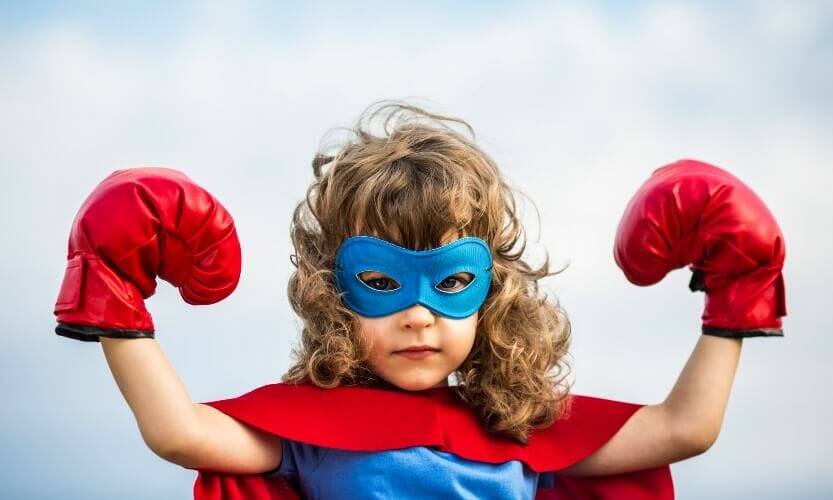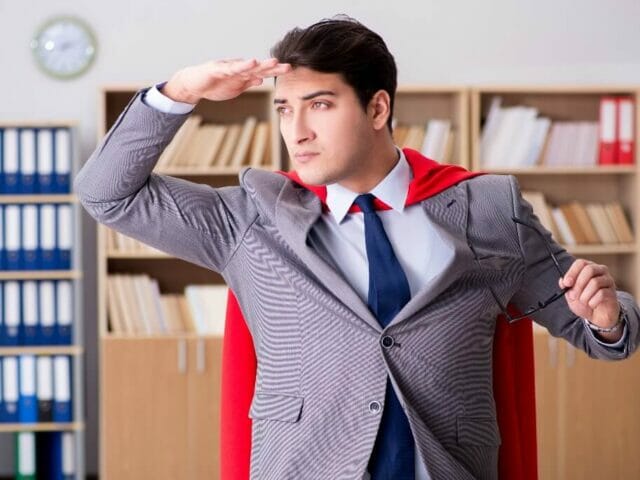There are times when a character just leaps off the pages of a book and makes a home in your heart.
There are times when a character simply draws you into the pages and keeps you swimming in the book, unaware of the real world around you.
And then, there are also times when a character makes you want to punch them in the face, only to root for them as the story unfurls.
In this article, we’re going to figure out how your hero can be one such compelling character.
We’ll go through the definition of hero, types of heroes, and how you can make your own character evolve into the hero you want them to be.
What Is A Hero?
A hero is the sole protagonist of a story; they are the main character.
They often have admirable qualities, even if they are flawed. But they could be nearly villainous characters too, who, by way of the story, develop some of these admirable qualities.
There can be multiple things that make a hero out of a character– apart from the fact that you, the writer, chose this character to be the hero, of course.
However, undergoing testing circumstances is one thing that’s sure to make a character a hero.
Heroes have Herculean – yet human – struggles. It’s the extraordinary human spirit that they show that makes them heroes.
No matter the kind of personality your hero has, if they’re not metaphorically thrown under a bus, they don’t feel human enough for your readers.
Heroes’ character arcs pretty much dictate the narrative of the story. The journey of the hero is a process and framework in itself.
You’ll likely have heard of the various stages of a hero’s journey. If not, well, Joseph Campbell’s Hero’s Journey is the quintessential writer’s guide to all things character.
No matter their journey, though, heroes largely fall into seven categories.

Types Of Heroes
Here are the seven different types of heroes:
Epic Hero
Noble birth, seemingly divine powers, and God-like perfection are the hallmarks of an epic hero.
Epic heroes are nearly invincible, with superhuman abilities, making them willing soldiers who fight for their people.
Epic heroes can be found in mythology (Hercules) and superhero comics alike (Superman).
Hercules
Hercules is arguably the best example of an epic hero. He’s the embodiment of what the ancient Greeks considered ideal.
Be it battling monsters, performing feats of strength, or rescuing those in need, Hercules is the ultimate fulfilment of Grecian perfectionism. Even when, in some accounts, he kills his own wife and children, he seeks out redemption from his sins, making this trait a kind of perfection in itself!
Superman
He might have been raised as an ordinary human being by his adoptive parents, but Clark Kent is anything but ordinary. If anything, his otherworldly powers make him a near-Messiah sent to planet Earth!
Even when his powers deteriorate in the presence of Kryptonite, Superman’s bravery and sense of duty never fail.
Classical Hero
Often depicted as brave, strong, and selfless, classic heroes are willing to put their own lives on the line to protect others and fight for justice.
They are characters who have abilities, skills, or powers that set them apart from their peers and contemporaries.
They might seem ordinary at first, but as the story progresses, they reveal themselves to be extraordinary. Harry Potter, Spiderman, and Luke Skywalker are such classic heroes.
Harry Potter
Harry Potter is a classical hero in more ways than one. Of course, the fact that he comes across as a scrawny preteen, but is actually a wizard, makes him a top qualifier for this hero type.
He’s brave enough to willingly confront the Dark Lord Voldemort. Even better, when he wins the elder wand, the most powerful wand known to the wizarding world, he chooses to bury it so that its power doesn’t make him, or others, evil. Come to think of it, his immensely strong sense of right and wrong makes Harry an archetypal character to look up to.
Spiderman
Peter Parker is an average and rather dorky guy until he gains special abilities. As Spiderman, he has superhuman strength, speed, and agility.
Despite having such powers, he’s unable to save his uncle from a fatal gunshot. Losing his uncle comes as a great personal loss for Peter. And yet, when it comes down to seeking revenge, Spiderman is a very willing hero, who chooses forgiveness over brute force, time and time again.
Everyman Hero
The everyman hero is the type of hero who represents the ordinary person, rather than the larger-than-life figures typically associated with epic heroes.
They may not have superhuman powers or incredible abilities, but they’re able to overcome obstacles through their determination, resourcefulness, and ordinary human strengths.
They may not be as flashy or impressive as more traditional heroes, but they are no less admirable or heroic for it. Katniss Everdeen from Hunger Games andFrodo Baggins from Tolkien’s The Lord Of The Rings are pretty much the epitome of the everyman hero archetype.

Frodo Baggins
Frodo is a comfort-loving hobbit and not particularly special – and certainly not powerful – on his own. Though, with some help, he takes on the monumental task of destroying the One Ring and defeating the dark lord Sauron. Frodo persists in his quest, through bravery, resilience, and a deep sense of responsibility.
He might be ordinary, but Frodo’s inner strength is extraordinary. Ultimately, Frodo represents the idea that anyone, no matter how seemingly insignificant or unremarkable, can rise to greatness and do something truly heroic.
Katniss Everdeen
Katniss is all of sixteen years old when she has to represent her district in the Hunger Games. It’s a brutal annual competition in which young people are forced to fight to the death, and yet, Katniss emerges as the victor, using her survival skills and resourcefulness.
Throughout the series, she becomes a symbol of hope and rebellion for her fellow citizens. Despite being a hero, Katniss is very realistic as a character. She can’t forgive her mother who abandoned her; she has a first-born complex, if you will, trying to protect anyone younger than herself, just as she does her sister Prim; and she also suffers from PTSD.
Anti-Hero
The traits of an anti-hero are more villainous than heroic.
They are selfish, greedy, dishonest and immoral in various ways.
Often, they have a troubled past that chisels their layered personalities. However, in the end, they do the morally right thing, because they know deep down, that they want to do good.
“Felonious” Gru from the animated movie Despicable Me and Han Solo from the Star Wars series are great examples of anti-heroes.
Gru
Gru starts out as a supervillain who is bent on stealing the moon, and even goes so far as to adopt three girls as daughters, just to trick his enemy.
But as the story progresses, he begins to develop a sense of morality and even becomes a caring father figure to the orphaned girls under his care.
In the film, we get a glimpse of Gru’s mother who’s cold and distant towards him. It is possible that her emotional unavailability shaped Gru’s villainy to some extent, as he often does villainous things for attention – something his mother wouldn’t give him. But in raising the orphaned girls, he finds himself nurtured too. It’s how he starts using his skills and resources for heroic deeds, instead of villainous ones.
Han Solo
Han Solo starts out as a cynical smuggler, driven purely by self-interest. However, as the story progresses, he becomes more selfless and heroic, eventually joining the Rebel Alliance and becoming a key player in the fight against the Galactic Empire.
Han Solo ultimately becomes a heroic figure as he learns to put aside his own interests and fight for a greater cause.
He is a classic example of an antihero, capable of both good and evil, but ultimately choosing to do good.
The Tragic Hero
This type of hero is a classic figure in literature and drama, particularly in the tragedy genre. Tragic heroes are usually noble and have a tragic flaw that ultimately leads to their downfall.
Think Romeo from Romeo and Juliet and Oedipus from Oedipus the King. Popular fiction has them too; Jay Gatsby is also a typical tragic hero.
Jay Gatsby
Jay Gatsby, the protagonist of F. Scott Fitzgerald’s novel The Great Gatsby, is a self-made man who goes from rags to riches, but through questionable means.
He’s manipulative, selfish, and greedy. His inability to let go of the past and his obsession with reclaiming his lost love Daisy Buchanan, leads to his downfall, making him a typical tragic hero. As a result, Gatsby serves as a cautionary tale about the dangers of greed, excess, and obsession.
Oedipus
Oedipus’ ego and pride blind him to the truth of his own identity, leading to a series of horrifying events, ultimately ending in his downfall.
Oedipus is determined to solve the mystery of the plague that is afflicting his city and to find the murderer of the previous king, Laius. In his pursuit of the truth, he discovers his own responsibility in the death of the former king, who was his father, and how he has ended up marrying his own mother!

Byronic Hero
A Byronic hero is a type of character that embodies the qualities of the romantic hero, but is troubled by their own brooding nature and rejection of societal norms.
They are depicted as being intelligent, charismatic, and emotionally intense. But they are also prone to mood swings, self-destructive behaviour, and a sense of alienation from society.
Lord Byron’s own literary alter ego (Childe Harold), Heathcliff from Emily Bronte’s Wuthering Heights, and Mr. Darcy from Jane Austen’s Pride and Prejudice are great examples of the Byronic hero type.
Heathcliff
Heathcliff fits this mould perfectly. He’s a complex and troubled character driven by his passions and desires. He is fiercely independent and rebellious; he refuses to conform to the expectations of those around him.
Despite his all-consuming rage, Heathcliff is also deeply vulnerable. His actions are often motivated by his intense love for Catherine, the woman he is unable to have.
Mr Darcy
A proud and haughty man, Mr Darcy looks down on those around him, particularly the Bennett family. He’s also slow to form friendships or connections with others, even though he develops a passion for Elizabeth Bennet.
However, as the novel progresses, he begins to reveal his true nature, which is marked by a deep sense of honour.
Reluctant Hero
A reluctant, or unwilling, hero is a type of character who is thrust into a position of heroism, often against their will or initial desires. These characters may be reluctant to take on the mantle of a hero because they feel unprepared, unsure of their abilities, or simply because they don’t want the responsibility that comes with it.
They may initially resist their role as a hero, but they ultimately embrace it and use their unique skills and talents to make a positive difference in the world.
Ove from Frederick Backman’s A Man Called Ove and Ned Stark from George R R Martin’s A Game Of Thrones are great examples of this hero type.
Ove
Initially, Ove is a grumpy old man who resists the changes brought about by his new neighbours, and is unwilling to get involved in their lives or help them in any way.
Despite his initial reluctance, Ove softens and goes out of his way to help others.
In fact, he becomes a mentor and a friend to the whole neighbourhood.
In the end, Ove’s transformation from a grumpy and solitary man to a selfless and caring hero is a central theme of the novel.
Ned Stark
Ned is a man of honour and integrity who values duty and loyalty above all else. When King Robert wants to recruit him as his Hand, Ned is reluctant to take up the role. He’s much more comfortable as a follower, than he is as a leader.
However, when it comes to doing the right thing – like saving the Targaryen girl’s life – he makes use of his position wisely, but at great personal risk. His strong sense of duty and morality make him a good hero, even if he’s reluctant to accept that status.

Frequently Asked Questions
How Do You Classify A Hero?
A hero can be classified based on their personalities, archetypes, and functions. A hero’s personality is essentially the kind of individual they are, archetype is the role they play in relation to other characters in the story, and function is the value they bring to the society in the story and to readers. The seven types of heroes mentioned in this article are classified largely based on the hero’s innate personalities.
What Are The 7 Types Of Heroes?
Here are the 7 types of heroes based on their personalities:
- Epic hero
- Classical hero
- Everyman hero
- Anti-hero
- Tragic hero
- Byronic hero
- Reluctant hero
How Can You Create A Compelling Hero?
- Decide what type of a hero your character is most likely to be.
- Make sure you have clarity on your hero’s journey and its stages.
- Ensure the tasks ahead of them seem insurmountable.
- And don’t forget: your hero needs to be as relatable as possible, flaws and all.
Hero Archetypes
As an author, it’s highly beneficial for you to see what type of a hero you’d like your character to be.
And it’s okay if it feels like there are overlaps between different types of heroes in the case of your own protagonist.
For instance, Byronic heroes and everyman heroes are often also reluctant heroes. But that’s just the complexity of characters.
As long as you know primarily how you want to represent your hero, you’re sure to have a strong narrative arc to your story.
Jericho Writers is a global membership group for writers, providing everything you need to get published. Keep up with our news, membership offers, and updates by signing up to our newsletter. For more writing articles, take a look at our blog page.










